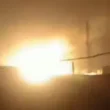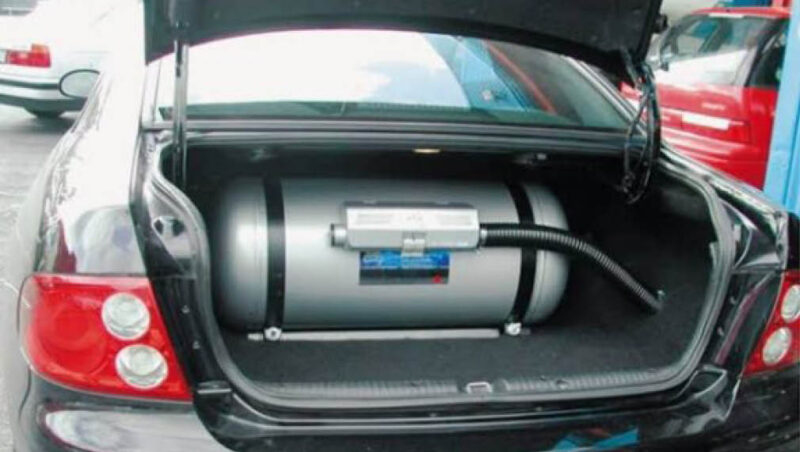The Federal Government’s ambitious initiative to revolutionize Nigeria’s transportation sector by switching commercial and private vehicles from petrol to Compressed Natural Gas (CNG) is currently grappling with significant obstacles.
Despite the initial excitement and heavy investment, industry insiders and users across the country are increasingly frustrated with the scarcity of CNG supply and the glaring inadequacy of supporting infrastructure such as refill stations and vehicle conversion centers.
According to a report by PUNCH, the program, championed as a solution to reduce Nigeria’s heavy reliance on petrol and to promote cleaner, more affordable fuel alternatives, now risks being undermined by logistical bottlenecks and operational setbacks.
Infrastructure Deficits and Supply Shortages Undermine Progress
Stakeholders in the transportation and energy sectors told Financial Vanguard that while the idea behind the switch to gas-powered vehicles was sound, the lack of sufficient refill stations and limited availability of CNG itself are creating huge operational difficulties. This has led many early adopters and investors to question the viability of the initiative.
Although petrol remains readily available and widely accessible across Nigeria, CNG users often face long, discouraging queues at the few existing refill points. Some private owners and commercial operators, frustrated by the inconvenience, have begun reverting their vehicles back to petrol.
This national picture of inadequate service is echoed in many states, where either the CNG scheme has not taken root or the infrastructure that does exist is underutilized or dysfunctional.
Government Incentives and the Policy Framework
The Federal Government set out to promote the adoption of CNG through several incentives designed to reduce the cost burden on operators. These included the removal of Value Added Tax (VAT) on CNG equipment and infrastructure, as well as on liquefied petroleum gas (LPG) conversion kits.
On May 13, 2024, President Bola Tinubu issued a directive requiring all Federal Ministries, Departments, and Agencies (MDAs) to procure and utilize CNG vehicles as part of a broader push to mainstream the fuel across government operations.
Crucially, the government also committed to funding the free conversion of one million commercial vehicles nationwide, aiming to lower public transportation costs by reducing fuel expenses.
Licensing Issues and Allegations of Sabotage
Investigations reveal that regulatory hurdles, particularly delays in approving licenses for new CNG refill stations, have worsened the supply shortage at existing outlets, especially in Abuja and other key cities.
Several users have raised suspicions that entrenched interests within the petrol distribution chain may be resisting the transition to CNG. According to one truck driver, certain downstream operators and regulatory officials benefit financially from petrol imports and have little incentive to support the widespread availability of gas.
“If more people easily access CNG, petrol demand would drop, and those making money from petrol imports would lose out,” he said. “So why are new stations not being allowed?”
User Experiences: Frustrations and Long Queues
The struggle to access CNG is evident from the firsthand accounts of commercial drivers and private car owners. Many report spending several hours, sometimes days, waiting in long queues to refill their tanks.
A truck driver working for a major cement company revealed that he and his colleagues sometimes spend an average of six days just to refill their vehicles.
“Imagine getting N20,000 from my company for fuel but then spending almost a week waiting in line at a gas station. It’s a huge loss,” he lamented.
Similarly, a commercial taxi operator described how long wait times—sometimes four to six hours—are forcing many operators to revert to petrol for practical reasons.
Regional Snapshots: Abuja and Nasarawa
Abuja’s situation encapsulates the challenges nationwide. While the Abuja-Keffi road has nearly 50 petrol stations, it has only one CNG refill station located in Ado, Nasarawa State — and that station is often non-functional.
Motorists and commercial drivers expressed frustration over the scarcity of conversion centers and working refill stations along the route. Many who had considered switching to CNG decided against it due to the lack of support infrastructure.
A public servant in Abuja recounted how the time spent refilling gas made the switch untenable for his busy schedule, despite the significant cost savings.
“There are only about 10 CNG stations in Abuja, and that’s not enough to meet demand. Some taxi drivers even sleep at stations just to get gas,” he said.
Lagos and the South East: Mixed Progress and Persistent Challenges
In Lagos, the country’s commercial nerve center, CNG supply shortages are also acute. Many stations, including major hubs in Ikeja, Mushin, and Apapa, frequently run out of gas.
One government-approved outlet confirmed a shortage of conversion kits needed to convert vehicles to CNG, which further hampers uptake.
The South East presents a mixed picture. Enugu State has procured 50 CNG buses, with plans to add 50 more, although these buses remain parked and underutilized as conversion and refill facilities lag behind.
Ebonyi State has recently begun embracing the initiative by purchasing CNG buses to transport civil servants and students free of charge, but actual service deployment is still pending.
Abia State has opted instead to focus on electric buses for its urban mass transit, though it welcomes private investment in CNG buses.
Anambra State’s private sector has taken the lead, with Innoson Vehicle Manufacturing establishing a CNG vehicle manufacturing and conversion center. However, adoption among ordinary citizens remains limited.
South South: The Gas Hub’s Missed Opportunity
The South South, home to Nigeria’s major gas reserves, remains paradoxically disconnected from the CNG transition.
States like Delta, Akwa Ibom, Bayelsa, and Cross River have no reported deployment of CNG buses or related infrastructure.
Labour leaders and vehicle owners in these states described the initiative as “not running as expected” and noted a lack of government or private sector involvement.
In Bayelsa, the National Union of Road Transport Workers said they have not received any CNG buses or equipment.
In Delta, despite the signing of a Memorandum of Understanding between the state government and NIPCO Gas Limited for a CNG conversion center, the impact on the ground is yet to be felt.
In Warri, commercial drivers highlighted that most filling stations remain designed solely for petrol, making vehicle conversion impractical.
Similarly, Akwa Ibom, despite early enthusiasm and government declarations of support, has yet to see any tangible CNG deployment. Construction of a mother station for CNG is ongoing, but operations have not commenced.
Why the North Is Missing Out?
The lack of CNG infrastructure in Northern Nigeria is a particularly pressing issue. The initiative has not fully penetrated the region due to logistical challenges and the absence of a reliable distribution network.
Northern states have limited conversion centers and refill stations, leaving many drivers reluctant or unable to switch to CNG.
Efforts are reportedly underway to address these gaps, but progress remains slow, and northern motorists continue to depend heavily on petrol.










